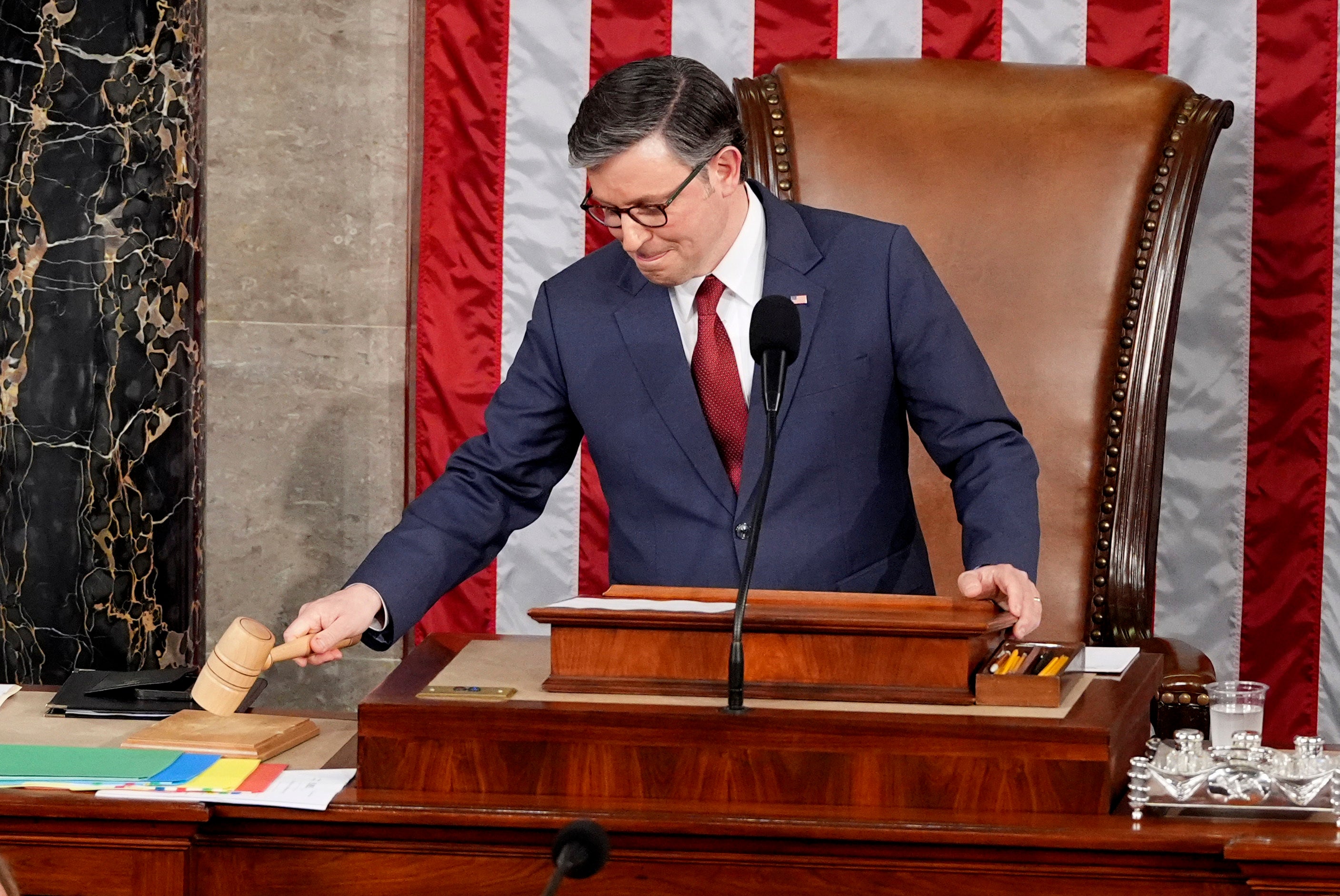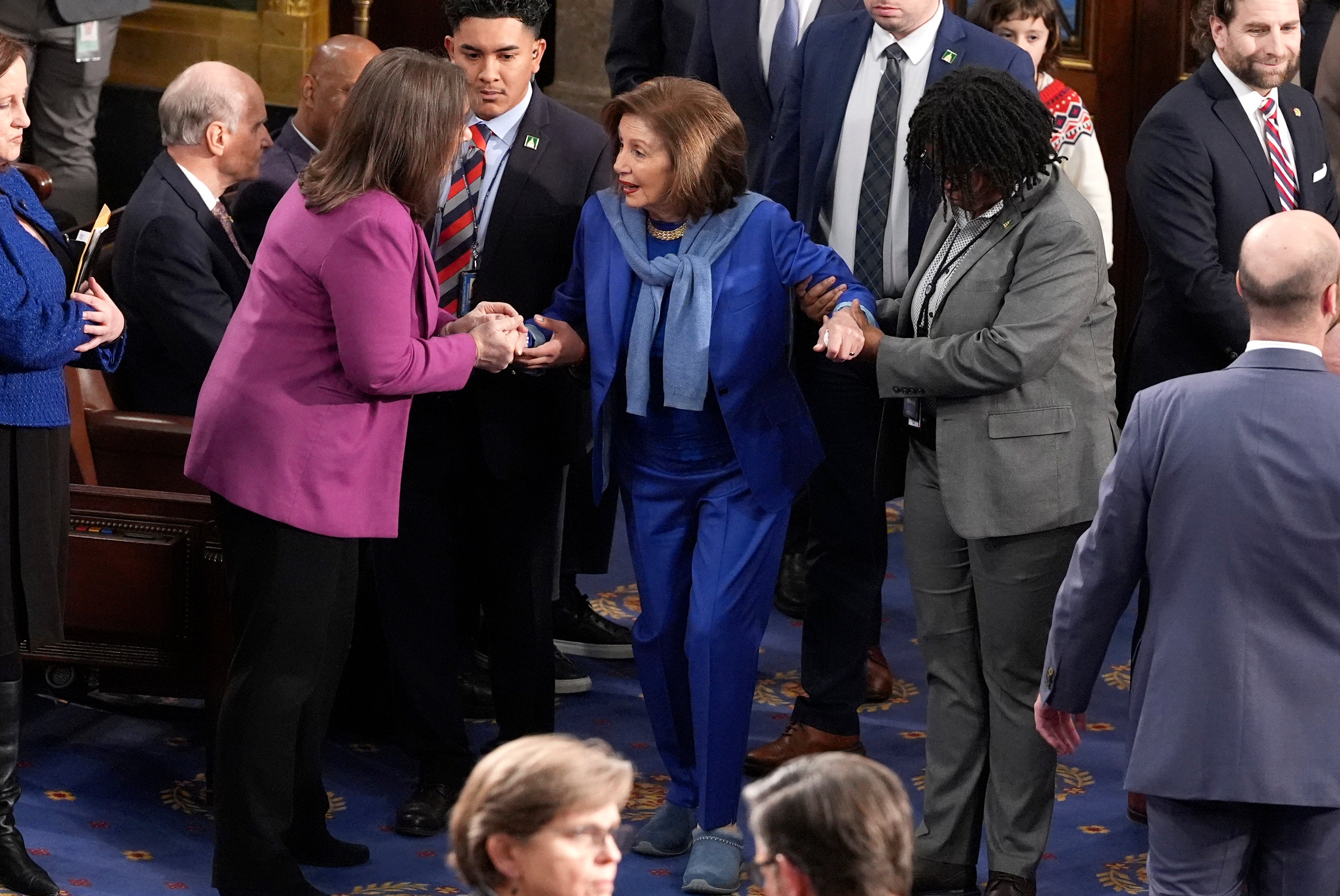Trump-backed Mike Johnson remains House speaker after Republican holdouts flip votes at last minute
Johnson held onto the speaker’s gavel after Ralph Norman and Keith Self swapped their votes

Your support helps us to tell the story
From reproductive rights to climate change to Big Tech, The Independent is on the ground when the story is developing. Whether it's investigating the financials of Elon Musk's pro-Trump PAC or producing our latest documentary, 'The A Word', which shines a light on the American women fighting for reproductive rights, we know how important it is to parse out the facts from the messaging.
At such a critical moment in US history, we need reporters on the ground. Your donation allows us to keep sending journalists to speak to both sides of the story.
The Independent is trusted by Americans across the entire political spectrum. And unlike many other quality news outlets, we choose not to lock Americans out of our reporting and analysis with paywalls. We believe quality journalism should be available to everyone, paid for by those who can afford it.
Your support makes all the difference.Mike Johnson has become speaker of the House after a dramatic delay caused by a handful of insurgent Republicans who revolted against him during the first vote of the 119th Congress.
Johnson ultimately earned the vote of 218 Republicans, the bare minimum needed to win the speaker’s gavel, after discussions with two holdouts — Ralph Norman of South Carolina and Keith Self of Texas — who ended up flipping their votes at the last moment. According to CNN, Trump called both lawmakers while the voting was still open and urged them to throw their weight behind Johnson.
Thomas Massie, the idiosyncratic libertarian Republican from Kentucky, led the opposition against Johnson, voting instead for House Majority Whip Tom Emmer. Norman initially voted for Jim Jordan of Ohio, and Self voted for Byron Donalds of Florida.
While Johnson had plenty of hard-right Republicans on his side, a handful of conservative lawmakers sat out the initial vote, including Chip Roy of Texas, who stood in the middle of the aisle as his name was called and remained silent. Roy ultimately voted for Johnson at the end of the roll call.
At first, it appeared Johnson would have to wait for a second ballot as the House stood still for a nearly 90-minute period, during which he conferred with the recalcitrant members in the GOP cloakroom.
At approximately 2:30 p.m., Norman and Self emerged from the cloakroom and walked to the clerk’s desk at the foot of the speaker’s rostrum.
After a brief exchange, the acting clerk called the House back to order and both members were recorded as changing their votes, giving Johnson the majority and the gavel it confers.
Self later told reporters he switched his vote after receiving assurances that Johnson would give members of the hardline House Freedom Caucus more input into crafting the party-line legislation that will need to pass the House and Senate under arcane procedures to avoid use of the upper chamber’s filibuster that requires a de facto supermajority including seven Democrats to pass anything.
“We know this will be a heavy lift to get the Trump agenda across the line in the reconciliation package, so we shored up the negotiating team — that’s all we did,” he said.
Self also said he’d received a phone call from Trump after his initial vote but refused to go into detail, telling reporters that the president-elect “has the same agenda I do.”

The reversal leading to Johnson’s victory comes after President-elect Donald Trump endorsed Johnson and said he would make calls on Johnson’s behalf in the days leading up to the vote for a speaker, which must be completed before the House can conduct any further business.
Trump weighed in to congratulate Johnson on Truth Social just minutes after the vote, writing that the newly-minted speaker had earned “an unprecedented Vote of Confidence in Congress.”
He added: “Mike will be a Great Speaker, and our Country will be the beneficiary. The People of America have waited four years for Common Sense, Strength, and Leadership. They’ll get it now, and America will be greater than ever before!”
But the House under Johnson’s leadership may not be sailing into smooth waters despite his work to avert the chaos that ensued when it took a record 15 ballots to elect former speaker Kevin McCarthy two years earlier.
Republicans have only 219 seats, a slim majority, meaning a single defection on their side can block their agenda. That number will whittle down in the coming weeks as Republicans like Elise Stefanik of New York and Michael Waltz of Florida leave to join Trump’s administration. And the special elections required to fill those vacant seats won’t take place for months at minimum.
With such a narrow margin, the Republican majority will need to either work in total lockstep to pass legislation or work with Democrats to get anything done.
That would not be out of character for Johnson, formerly a relatively unheralded backbencher, who came to power as a compromise candidate after the unprecedented ouster of McCarthy in October 2023.
At the time, a small group of Republicans banded together with the entire House Democratic Caucus to remove McCarthy from the speakership using a procedural maneuver called a “motion to vacate the chair” after he allowed legislation to avert a government shutdown and fund defense aid to Ukraine to pass the House and become law with President Biden’s signature.

Hardline members of the GOP caucus have frequently railed against successive House speakers from their own party for crafting bipartisan spending legislation that includes provisions favored by Democrats. They have demanded that Johnson — and his predecessors — adhere to an informal guideline called the “Hastert Rule” when deciding whether legislation can be voted on.
That unofficial rule, named for disgraced GOP former speaker Denis Hastert — the wrestling coach turned Illinois congressman who has served prison time for financial crimes related to his effort to buy the silence of a former student who he had molested decades ago — restricts legislation from being voted on unless it has support from the majority of the GOP conference.
Johnson has landed himself in hot water with some in his party since becoming speaker by allowing use of the “suspension calendar” to pass legislation on a bipartisan basis with two-thirds votes of the House.
Recently he drew hardliners’ ire by attempting to put forth a compromise bill to avert a government shutdown late last month as Congress rushed to complete work for the year before breaking for the Christmas and New Year’s holidays.
The roughly 1,500-page bill he had helped draft was savaged by right-wingers led by Elon Musk, Trump’s financial benefactor and one of the future heads of his government efficiency advisory group. A number of GOP hardliners were upset that the bill was crafted with input from Democratic leadership, while Musk went on a posting storm against the bill in which he spread numerous false claims about what it included and did not include.
Johnson pulled it from consideration after Trump himself demanded that the stopgap spending bill to keep the government open also lift the country’s statutory debt ceiling so he could blame any resulting spending on the incumbent Biden administration, but a replacement bill doing just that failed to garner enough support from Republicans to pass along party lines.
Johnson, after consulting with House Democratic Leader Hakeem Jeffries and the Senate majority and minority, later put forward a slimmed-down bill that will keep the government running through March.
Ahead of the vote, Johnson insisted he would not engage with horse trading the way that McCarthy did when he pursued the speakership.
“I don’t make deals with anyone,” he told reporters. “There’s no quid pro quo here. I don’t do anything in exchange for a vote other than commit to make this institution work as effectively and efficiently as possible.”
The victory for Johnson sets up Republicans as they also took control of the Senate majority on Friday. Vice President Kamala Harris, who lost to Trump, swore in the new senators.
“It was a good day today,” the vice president told The Independent.
Join our commenting forum
Join thought-provoking conversations, follow other Independent readers and see their replies
Comments